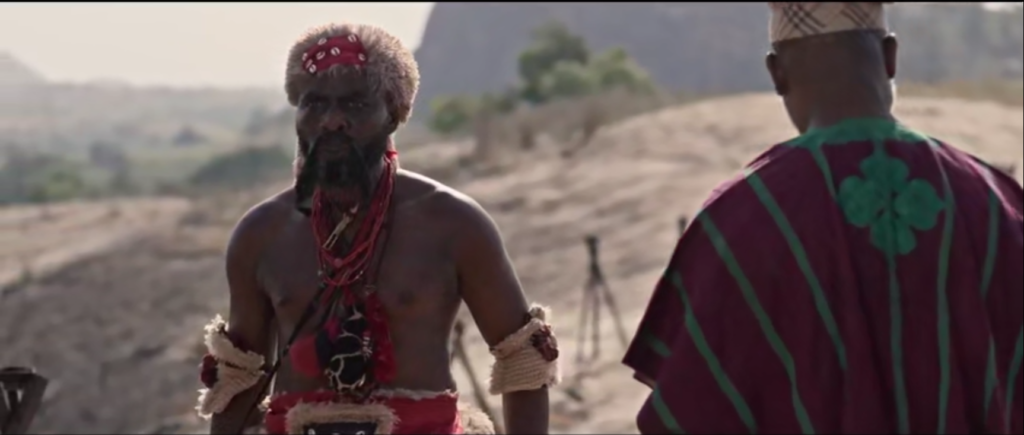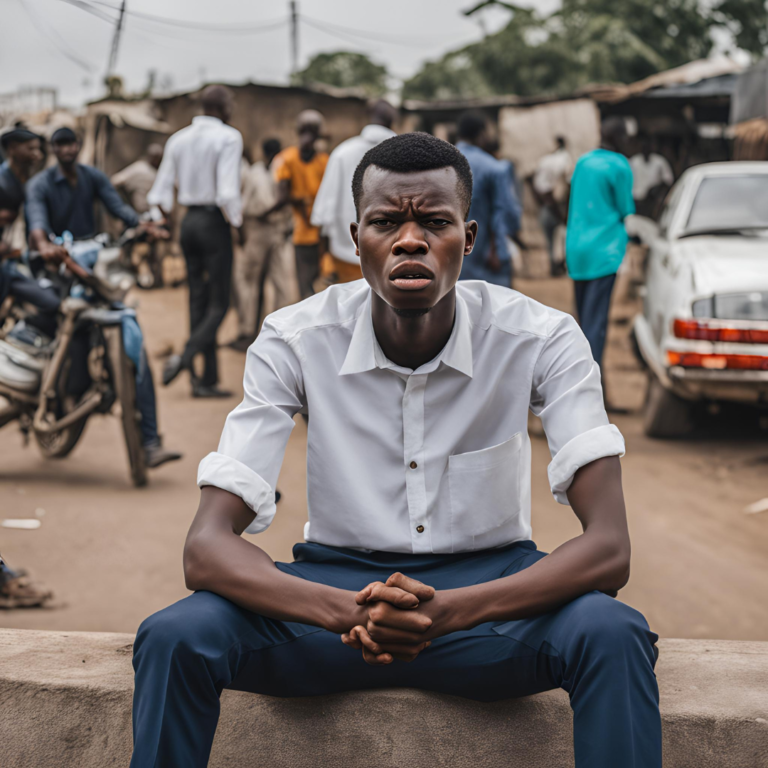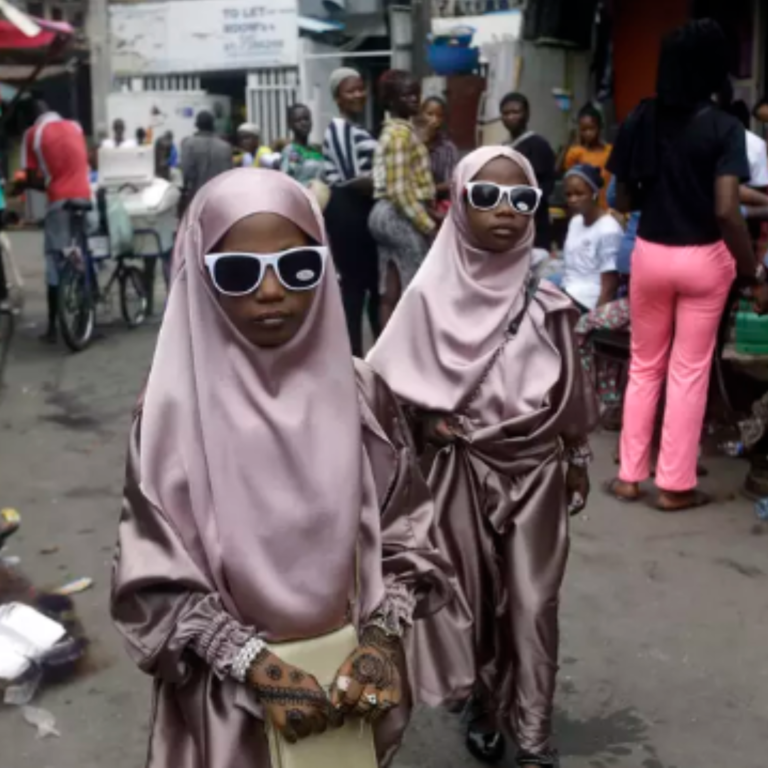It’s hard to watch movies for leisure these days. But the internet people’s noise over Jagun Jagun couldn’t be ignored. If I didn’t leave X (FKA Twitter) and run to press play, the memes would’ve ruined the experience for me.
Anyway, let’s get into it.
Once I heard the traditional drums and chants, and saw the wide drone shot of a thick forest, I knew I was in for an interesting one. Next thing, there’s a strangely artistic mud house sitting on a rock.
The narrator describes a powerful warrior and jazzman called Ogundiji (Femi Adebayo), and we see him swagger to his throne in a dark fur garment that drags after him. A king looks at him like he’s glaring at God. According to the narrator, Ogundiji is “the messenger of the powerful people.” But this king, who’s supposed to be a powerful client, looks more like an Ogundiji groupie.
An unnamed warrior (Odunlade Adekola) raids a kingdom called Keto, holds the royal family hostage, kills the prince and steals the crown. He draws his sword in the air one last time, but before he can take the king’s head, a weapon comes of from nowhere and butchers his hand off. Blood springs everywhere, Quentin Tarantino style.
Everyone’s shook, including the new amputee himself. It’s Ogundiji in the building. Bully pass bully.
Far away from all the chaos, a young man walks through the forest when he’s suddenly waylaid by a huge tree. He composes himself and talks to the fallen tree, commanding it to let him pass. Lo and behold, the tree stands and gives him the way.
Thankfully, there’s a narrator to read this tree commander’s profile, so I didn’t have to wonder who he is. Gbotija (meaning “Only answer to fights”) is the son of Lagbayi, from a long line of wood carvers. So naturally, he has the power to talk to trees. He’s on his way to enroll in Ogundiji’s School of Warriors, to learn the art of war.
After some training, the time finally comes for the student warriors to go on their first mission — to wage war on a small settlement called Ota Efon. If you’re looking for dark magic that turns day into night and produces cannons of fire, you find it here. You’ll get flying kicks, sword fights and acrobatic moves too. Despite it all, Ogundiji’s trained warriors are met with resistance.
While the war is ongoing, and Ogundiji’s men are suffering defeat, his top generals make merry somewhere in the bush, waiting for their juniors to finish business and come back to them. Ogundiji’s deities notify him of this at home. Sharp-sharp, he goes into his control room to command his killing machine, the demon assassin, Agemo, to win the war for him.
Agemo appears on the battle ground and puts everyone on pause. Then breezes through the warriors to slice and murder the soldiers on the other side. After the war, Ogundiji throws the merry-making generals into prison.
Night falls, and it’s time for dinner — akara and pap. But Gbotija, the tree commander, isn’t having it. Rightfully. After trekking to another town to fight war, and trekking back, why should two people share one akara and pap? Even the agbado era isn’t this heartless (but who knows? God, abeg).
Iroyinogunkitan (meaning “News of war never ends”), Ogundiji’s daughter, makes a scapegoat of Gbotija. They tie him to a tree and beat him black and blue like the Inter Milan jersey. The man has the pain bandwidth of Kunta Kinte, because why did they beat him to a pulp of paper maché, and he still won’t keep his mouth shut?
After the cruel show of supremacy, Iroyinogunkitan asks him to be her friend, giving him these “come and fuck me” eyes.
While Ogundiji’s wife (Fathia Balogun) begs him to forgive the imprisoned generals, one of the junior soldiers, Weyinwo, is busy passing akara and pap to them inside the prison.
Ogundiji catches them red-handed but spares the generals and sentences the junior soldier to burn on a stake. Then he sends his burnt corpse back to his town.
On one side, the kings of the surrounding villages gather to plan their contribution to Ogundiji’s upcoming party. They troll each other about their undeserved thrones, a scene that felt too much like watching Nigerian politicians merry over the national cake.
On the other side, the burnt soldier’s girlfriend seeks a spiritual eye-for-an-eye by sending three ghost gunmen to kill Ogundiji’s wife. Gbotija talks to the dane guns made of wood and the gunmen eventually disappear.
Gbogunmi (meaning “Swallow war”), an alumnus of Ogundiji’s war school, comes to tell Ogundiji he can’t carry out an evil assignment to raid his own wife’s town. Angered, Ogundiji promises to punish him.
Everyone has heard that Gbotija saved Ogundiji’s wife. Gbogunmi befriends him and promises to gift him some charms. As Gbotija’s popularity rises, so does Ogundiji’s hatred for his student. He gives Gbotija a death sentence disguised as promotion tests. First, he tells him to fight Gbogunmi to the death.
Gbotija is victorious and qualifies for the second stage of the test — a seven-day dry fast while locked in a coffin.
Kitan and Gbotija bump genitals in preparation. After seven days, and even though Ogundiji ordered for the coffin to be thrown into a river — in a scene that gave the movie’s CGI budget a run for its money — Gbotija survives. Of course, the coffin is made of wood, and he’s a wood whisperer.
For his last test, Ogundiji sends him to annihilate a town during a Yemoja festival. Gbotija ends up turning their white clothes to blood red.
On his way back to the war school, Agemo attacks him. But why is Ogundiji trying to kill his own apprentice? After asking these questions and playing hide-and-seek in the trees with Agemo, the latter falls hard on a tree branch. Gbotija takes off the demon’s mask, and it’s his babe, Iroyinogunkitan.
As she dies, she reveals how she’s just a kid Ogundiji stole from a village he came to raid. Devastated, Gbojita enters Ogundiji’s compound with her corpse and reveals the cause of her death to Ogundiji’s wife. Their back and forth further reveals that Ogundiji has a son with a regent king in another town. Omo, there’s no greater betrayal than this. But the bombshell is that Ogundiji’s wife actually sacrificed her womb for him to gain powers.
Yet, this OG Yoruba demon has the audacity to ask what she’ll do about it. Ogundiji goes on to brag about his evil powers, and all the towns he’s conquered, when Gbotija realises he destroyed his own town. Ogundiji is the reason why his father had to sacrifice himself for Gbotija to live.
After realising he’s been fighting and killing for his father’s killer, he calls for support. The army divides into two, choosing sides to fight one last battle. During the ensuing chaos, Ogundiji’s wife stabs her husband with Agemo’s knife, demystifying his jazz and allowing Gbotija to finish him off.
It turns out “Jagun Jagun” isn’t about war, but love, betrayal and unchecked power. Gbotija only became a warrior to avenge his father’s death. Ogundiji didn’t value his wife or soldiers, all of whom sacrificed greatly for him.
But it didn’t really end there. Ogundiji’s son (Ibrahim Chatta) hears the bad news and comes running home.

Now that Ogundiji is dead, will his son inherit his fine fur capes and hats, or will they collect dust on a hanger somewhere?
We await part two.




